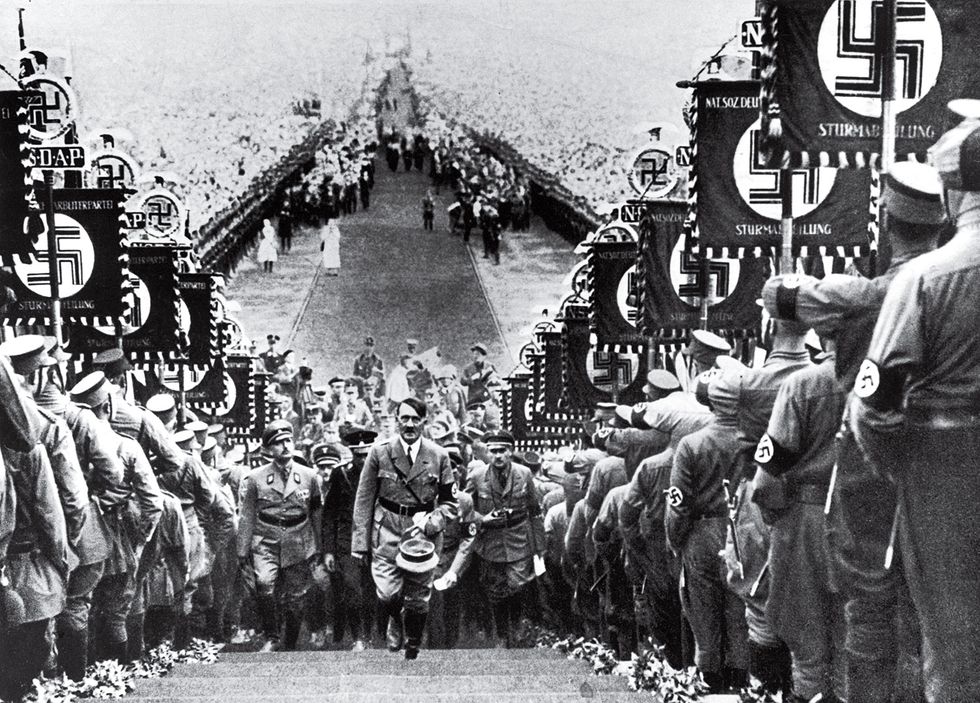I've very often heard the argument, especially recently, that Hitler and Nazism were allowed to flourish because of free speech. Most people are aware of who Hitler was in at least a general sense, and his leadership of the Nazis, and WWII, and the typical facts one learns in a high school history course.
However, some people attempt to twist what happened in Germany—using only their basic, unexpanded knowledge—into a case against free speech. And if this vital turning point in Western Civilization is misunderstood or warped, then it seems apparent to me that we're doomed to repeat what happened in Germany, in some form or another.
There are several reasons why this factually bankrupt argument must be challenged and stopped, as I will detail.
A common misconception about the spread of Nazism is that it was based solely on oratory. And there is some grain of truth in that: Hitler was a skilled orator, and it is arguably his oratory which led the Nazi party from a meeting of a few dozen veterans and misfits in the back of a pub to the dominant political force in Germany. However, it's absolutely crucial to understand that a large component of the Nazis' success was attributable not to the spoken word, but to the thrown punch. Paramilitary groups, comprised of thugs and brawlers, were actively dispatched by Nazi leadership to not only protect Nazi rallies and speeches, but disrupt by force the events of other political parties, the communists included.
This is all to say nothing of the infamous Beer Hall Putsch, in which Hitler rose to national fame by attempting to force the Bavarian leaders to publicly endorse his plan, by the point of his own gun to their backs, as he had the building surrounded with armed soldiers. So while the power of speech was an engine of the Nazi machine, brute force was absolutely another driving force that led them to prominence.
Upon his ascension to the chancellorship in January of 1933, Hitler was poised to roll out his plan for totalitarianism, or as it is better and more specifically known, fascism. While the meaning has become blurred, the literal definition, and historical record, aligns perfectly with Hitler’s outlaw of all other political parties except his own, effectively creating a one-party rule in the Weimar Republic and squeezing the last breaths out of that feeble democracy. On top of this, he also banned certain newspapers, another assault on free speech that further solidified his party's rule.
This is by no means a result of free speech; quite the opposite, in fact. Nazism stamped out any chance of legitimate free speech, not only when it was in supreme power, but even in its weaker beginnings as a grassroots movement. Fascist tactics were actively used to suppress free speech, not promote it.
Additionally, this recently-formed argument that free speech should sometimes be suppressed because it “allowed Hitler to rise” is completely absurd, because the same logic could be applied to any number of leaders in history, including Gandhi and Martin Luther King, Jr.
Free speech is not evil because it may give rise to evil people, nor can free speech be good because it gives rise to good people. It is the necessary avatar, the foundation upon which every functioning and free democracy is built.
While it seems evident that neo-Nazis hold evil beliefs, it seems imperative to me that we nip this growing sentiment that we need to suppress their freedom of speech in order to supposedly prevent another Hitler in the bud. By showing any partiality to political belief, irrespective of said belief’s public disapproval, the slope into authoritarianism becomes a slippery one.
The high ground is dissolved, because no matter how many Nazis you’ve punched and how many Richard Spencers you’ve shouted down on campus, suddenly a third party might find the moral waters a little more murky than before, since those Nazis at least haven’t violated free speech. Are they despicable in every other sense? Unquestionably. But to say that it is morally defensible to punch them and pepper spray them and shout them down and use whatever other means at your disposal to shut them up is completely baseless.
Free speech is the free exchange of ideas, not freedom to shut down those who disagree with you. So if there’s anything we’ve learned from the history of Nazism, it’s to make sure everyone has a level playing ground politically, keep the fists down, and let the free market of ideas weed out the disgusting ones.







 The minimum wage is not a living wage.
StableDiffusion
The minimum wage is not a living wage.
StableDiffusion
 influential nations
StableDiffusion
influential nations
StableDiffusion











